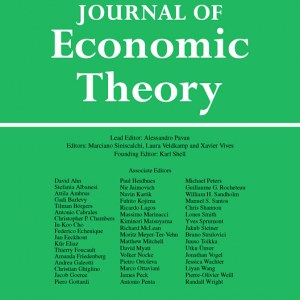
Arifovic, J., Hommes, C. and Salle, I. (2019). Learning to believe in simple equilibria in a complex OLG economy - evidence from the lab Journal of Economic Theory, 183:106--182.
-
Affiliated authors
-
Publication year2019
-
JournalJournal of Economic Theory
We set up a laboratory experiment to empirically investigate equilibrium selection in a complex economic environment. We use the overlapping-generation model of Grandmont (1985), which displays multiple perfect-foresight equilibria, including periodic and chaotic dynamics. The equilibrium selection problem is not solved under learning, as each outcome is predicted by at least one existing learning theory. We find that subjects in the lab systematically coordinate on an equilibrium despite the complexity of the environment. Coordination only happens on simple equilibria, in this case the steady state or the period-two cycle, a result which is predicted only if the subjects follow simple learning rules. This suggests that relevant perfect-foresight equilibria should be robust to the use of simple rules.